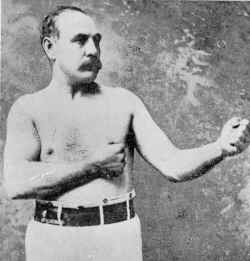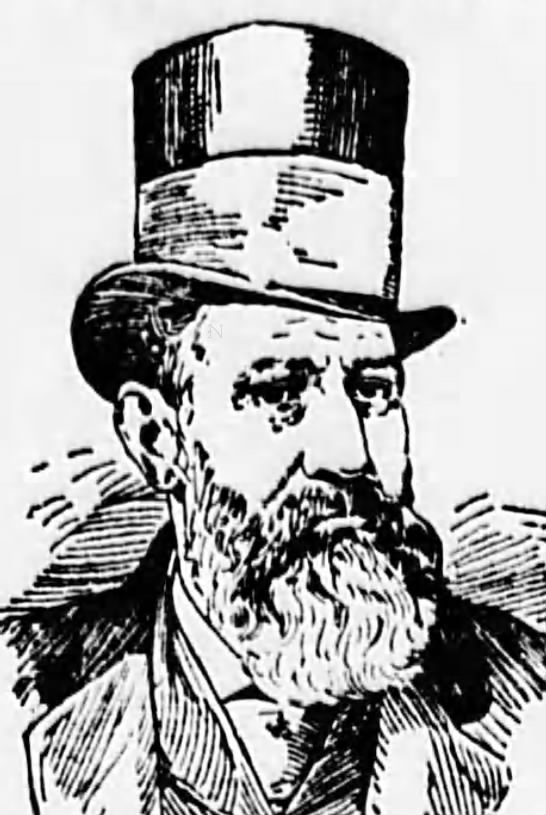Jem Mace slåss mot Joe Coburn
På November 30, 1871, en stor skara män gick ombord på tio järnvägsvagnar på New Orleans, Mobil och Texas järnväg när den stannade på Canal Street i New Orleans, Louisiana. Tåget fortsatte till Montgomery Station nära Bay St. Louis, Mississippi, där folkmassan lämnade regnet och tog sig in i skogen.
Such an odd procession could be cause for concern but these men were not bent on trouble. Instead they wanted to see the prizefight between World Heavyweight Bare Knuckle Prizefighting Champion Jem Mace and his former friend, Joe Coburn.

Jem Mace from the Public Domain
Prizefighting was illegal in most states, so fighter and spectators went to great lengths to avoid authorities. Even with the most carefully laid plans and discretion, sites for the fights were still often moved at the last minute to avoid local authorities.
Interest in this fight had been building since Mace defeated Tom Allen to claim the heavyweight title. While Mace and Allen became friends after the fight, Joe Coburn, who had seconded Mace, became disgusted with his old friend. Coburn challenged Mace for his title.
If those in Mace’s or Coburn’s inner circle knew the source of the enmity, they didn’t make it known publicly. Coburn may have just wanted a chance to fight for the championship.
Coburn did have a few physical advantages. Mace was already 40 år gammal, while Coburn was just 36. Coburn was also a better wrestler, an advantage in bare knuckle boxing, where throws were legal.
Both men were 5’09”. Mace was usually the smaller man but both men weighed 167 pounds for this fight. While the men would be super middleweights today, anyone over 150 till 160 pounds would often fight at heavyweight in the 19th Century.
The fight began at 12:20 p.m. on a cold morning. Spectators started several small fires to stay warm.
Bare knuckle rounds ended when a fighter was knocked down, thrown or took a knee. The first round lasted 30 minuter. Coburn boxed cautiously, while Mace focused on using his left jab. After a half-hour of cautious sparring, Coburn threw Mace, who landed painfully with his neck across the bottom rope of the makeshift ring.
The men continue sparring in the second round bringing complaints from the crowd, who want more action. Coburn concentrated on his body attack hoping to sap the strength of the older fighter. Mace finally cornered Coburn, who in desperation clinched Mace. During the ensuing grappling, Mace fell to his knees ending the second round.
The third round was significant because Mace was able to start peppering Coburn’s eyes with lefts and rights. Emellertid, Mace injured his left wrist during the offense. Coburn continued his body attack and ended the round by throwing Mace to the ground again.

Artist rendering of Joe Coburn around the time of his death in 1890 (Public Domain)
Most of the fight proceeded in this manner. Mace and Coburn looked more like they were in a sparring match because of their shared cautious boxing style. Both men even allowed the other to occasionally go to their corners for a drink and towel off during the rounds.
Coburn appeared the fresher of the two but during the fifth round he also deals with an injury. During the throw to end the round, both men landed on the ground awkwardly. Coburn injured his right hand and wrist. Both men fought the remainder of the fight injured. Mace had a badly swollen left hand; Coburn suffered the same injury to the right hand.
The men continued sparring cautiously for the remainder of the fight. By the twelfth round, both men were injured, exhausted and very little action occurred for the first 30 minutes of the round.
Despite several calls for a draw, Coburn initially refused to accept it. Slutligen, Colonel Hunt, a spectator and well-thought of sporting man, stepped into the ring.
“Herrar – As it appears one man is afraid and one man is afraider, I declare this to be a drawn fight, and all bets are off.” The crowd cheered and both men accepted the decision of a draw. It was just after 4:00 p.m. The fight had lasted 12 rounds over 3 timmar, 40 minuter.
Mace and Coburn buried the hatchet with a handshake after the bout. Mace declared Coburn the toughest man he ever met in the ring. Despite the pace of the bout, the crowd seemed happy with the fight as well.
While both men would continue boxing bare knuckle as well as in gloved contests, this bout was the last big fight for both men.
You can leave a comment or ask a question about this or any post on my Facebook-sida.
Source: New Orleans Republican, December 02, 1871 edition, p. 1
Pin It

